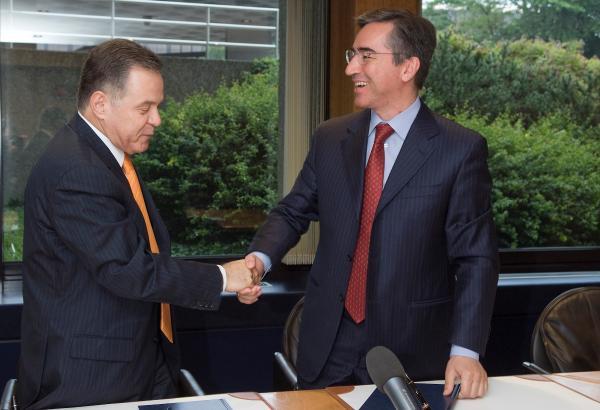
The European Investment Bank increases its support for the extension of the Athens metro by EUR 150 million. The agreement on the new credit facility was signed today at the Bank's headquarters in Luxembourg by Mr Plutarchos Sakellaris, EIB Vice-President and Mr Christos Tsitouras, chairman of Attiko Metro S.A.
At the signing ceremony, Mr Plutarchos Sakellaris said: "EIB has been supporting for more than 15 years the significant Metro investments undertaken both in Athens and Thessaloniki. The Athens Metro extension will reinforce the public transport system, providing a faster, more reliable and environmentally friendly mode of transport contributing significantly to a cleaner environment for the Greek capital. This project is a good example of the catalyst role the EIB can play in helping to co-finance major infrastructure projects with the public and private sectors".
Mr Christos Tsitouras commented: “Attiko Metro is particularly happy for having the possibility of a cooperation with the EIB. This allows us to realise the significant projects of the metro systems in Athens and Thessaloniki, with the support of the EU. I look forward to further cooperation for the future extensions of the metro in both Athens and Thessaloniki, which will serve the citizens of the two Greek metropoles. We believe, that as in the past, we will meet also this future challenge”.
This loan concerns mainly the design, construction and commissioning of the extensions of Lines 2 and 3, as well as the acquisition of trains. The Metro Line 3 Extension, 4.3 km long with three new stations extending from MONASTIRAKI to EGALEO was commissioned in May 2007. Line 3 continues to be expanded with the construction and commissioning of three (3) new Stations, while the next 1.4 kilometres of the above Line towards HAIDARI with one new Station is already at an advanced construction phase.
The project of the Extension of Line 2 to ELLINIKO will add to the ATHENS METRO network 5.5 km of Underground Line and 4 new Stations (ILIOUPOLI, ALIMOS, ARGYROUPOLI, ELLINIKO). The extension to Anthoupoli will further expand Line 2 with the addition of 1.5km and 2 stations.
The Athens metro is supported jointly by the Structural Funds and the EIB, as it meets the European Union’s objective to assist urban renewal and environmental protection. Total EIB financing for the Athens metro since 1994 totals now EUR 1.5 billion. The project will make a significant contribution to improvement of the quality of life in Athens, by alleviating traffic congestion and providing a cleaner and quicker alternative to cars and buses.
Note to editors:
About the EIB
What is the EIB?
The European Investment Bank was created by the Treaty of Rome in 1958 as the long-term lending bank of the European Union. The task of the Bank is to contribute towards the integration, balanced development and economic and social cohesion of the EU Member States. The EIB raises substantial volumes of funds on the capital markets which it lends on favorable terms to projects furthering EU policy objectives. The EIB continuously adapts its activity to developments in EU policies.
The EIB:
- enjoys its own legal personality and financial autonomy within the EU
- operates following strict banking practice and in close collaboration with the wider banking community, both when borrowing on the capital markets and when financing capital projects
Who are the shareholders?
The EIB's capital is owned by the 27 member countries of the EU. France, Germany, Italy and the United Kingdom each have 16.2%, followed by Spain, with just over 9%.
What types of project does it finance?
There are six financing priorities, which are laid down by the shareholders and EU mainly in the following sectors:
- convergence and cohesion, involving the poorest regions of the EU
- small and medium-sized enterprises
- energy
- research, development and innovation
- infrastructure
- environmental protection
Key figures: the EIB in 2009
Total financing operations: EUR 79 billion (+37%, compared with 58 billion in 2008) of which:
- EU countries: EUR 71 billion
- Accession countries: EUR 4.3 billion
- Neighbourhood and specific Mandates: EUR 3.7 billion
Total raised by issuing bonds on the international markets in 2009: EUR 79.4 billion EUR 59.5 billion in 2008) via 262 transactions (247 in 2008).
Greece: the EIB in 2009
In 2009 the EIB provided a total of EUR 1.6bn up 33% compared to EUR 1.2bn in 2008; of this amount, more than EUR 1bn was to support small and medium-sized enterprises (SMEs) and small and medium infrastructure investments to be carried out by private or public bodies, including the local authorities, as well as beneficiaries of any size. Financing was for investments in the fields of transport, industry, tourism, services, knowledge economy, energy, environmental protection and urban development. With a EUR 10mn loan for the Hellenic Fire Services the EIB inaugurated a new phase for Public Private Partnerships in sectors other than transport in Greece, while significant progress has been made on the implementation of the JEREMIE and JESSICA initiatives.

Photographer: imedia ©EIB
Download original

Photographer: imedia ©EIB
Download original

Photographer: imedia ©EIB
Download original

Photographer: imedia ©EIB
Download original